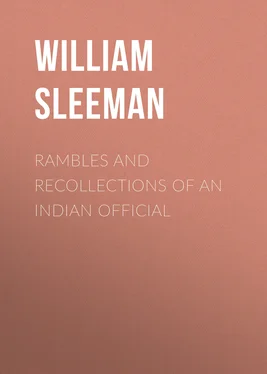William Sleeman - Rambles and Recollections of an Indian Official
Здесь есть возможность читать онлайн «William Sleeman - Rambles and Recollections of an Indian Official» — ознакомительный отрывок электронной книги совершенно бесплатно, а после прочтения отрывка купить полную версию. В некоторых случаях можно слушать аудио, скачать через торрент в формате fb2 и присутствует краткое содержание. Жанр: Путешествия и география, История, foreign_edu, foreign_antique, foreign_prose, на английском языке. Описание произведения, (предисловие) а так же отзывы посетителей доступны на портале библиотеки ЛибКат.
- Название:Rambles and Recollections of an Indian Official
- Автор:
- Жанр:
- Год:неизвестен
- ISBN:нет данных
- Рейтинг книги:4 / 5. Голосов: 1
-
Избранное:Добавить в избранное
- Отзывы:
-
Ваша оценка:
- 80
- 1
- 2
- 3
- 4
- 5
Rambles and Recollections of an Indian Official: краткое содержание, описание и аннотация
Предлагаем к чтению аннотацию, описание, краткое содержание или предисловие (зависит от того, что написал сам автор книги «Rambles and Recollections of an Indian Official»). Если вы не нашли необходимую информацию о книге — напишите в комментариях, мы постараемся отыскать её.
Rambles and Recollections of an Indian Official — читать онлайн ознакомительный отрывок
Ниже представлен текст книги, разбитый по страницам. Система сохранения места последней прочитанной страницы, позволяет с удобством читать онлайн бесплатно книгу «Rambles and Recollections of an Indian Official», без необходимости каждый раз заново искать на чём Вы остановились. Поставьте закладку, и сможете в любой момент перейти на страницу, на которой закончили чтение.
Интервал:
Закладка:
The military chiefs, essentially either soldiers or robbers, were continually fighting, either against each other, or against the peasantry, or public officers of the paramount power, like the barons of Europe; and that paramount power, or its delegates, often found that the easiest way to crush one of these refractory vassals was to put him, as such men had been put in Germany, to the ban of the empire , and offer his lands, his castles, and his wealth to the victor. This victor brought his own clansmen to occupy the lands and castles of the vanquished; and, as these were the only things thought worth living for, the change commonly involved the utter destruction of the former occupants. The new possessors gave the name of their leader, their clan, or their former place of abode, to their new possession, and the tract of country over which they spread. Thus were founded the Bundēlas, Pawārs, and Chandēls [ sic ] upon the ruin of the Chandēls of Bundēlkhand, the Baghēlas in Baghēlkhand, or Rīwā, the Kachhwāhās, the Sakarwārs, and others along the Chambal river, and throughout all parts of India. 292
These classes have never learnt anything, or considered anything worth learning, but the use of the sword; and a Rājpūt chief, next to leading a gang of his own on great enterprises, delights in nothing so much as having a gang or two under his patronage for little ones.
There is hardly a single chief of the Hindoo military class in the Bundēlkhand or Gwālior territories, who does not keep a gang of robbers of some kind or other, and consider it as a very valuable and legitimate source of revenue; or who would not embrace with cordiality the leader of a gang of assassins by profession who should bring him home from every expedition a good horse, a good sword, or a valuable pair of shawls, taken from their victims. It is much the same in the kingdom of Oudh, where the lands are for the most part held by the same Hindoo military classes, who are in a continual state of war with each other, or with the Government authorities. Three-fourths of the recruits for native infantry regiments are from this class of military agriculturists of Oudh, who have been trained up in this school of contest; and many of the lads, when they enter our ranks, are found to have marks of the cold steel upon their persons. A braver set of men is hardly anywhere to be found; or one trained up with finer feelings of devotion towards the power whose salt they eat. 293A good many of the other fourth of the recruits for our native infantry are drawn from among the Ujainī Rājpūts, or Rājpūts from Ujain, 294who were established many generations ago in the same manner at Bhōjpur on the bank of the Ganges. 295
CHAPTER 24
Near Tehrī we saw the people irrigating a field of wheat from a tank by means of a canoe, in a mode quite new to me. The surface of the water was about three feet below that of the field to be watered. The inner end of the canoe was open, and placed to the mouth of a gutter leading into the wheat-field. The outer end was closed, and suspended by a rope to the outer end of a pole, which was again suspended to cross-bars. On the inner end of this pole was fixed a weight of stones sufficient to raise the canoe when filled with water; and at the outer end stood five men, who pulled down and sank the canoe into the water as often as it was raised by the stones, and emptied into the gutter. The canoe was more curved at the outer end than ordinary canoes are, and seemed to have been made for the purpose. The lands round the town generally were watered by the Persian wheel; but, where it [ scil. the water] is near the surface, this [ scil. the canoe arrangement] I should think a better method. 296
On the 10th 297we came on to the village of Bilgaī, twelve miles over a bad soil, badly cultivated; the hard syenitic rock rising either above or near to the surface all the way—in some places abruptly, in small hills, decomposing into large rounded boulders—in others slightly and gently, like the backs of whales in the ocean-in others, the whole surface of the country resembled very much the face of the sea, not after, but really in, a storm, full of waves of all sizes, contending with each other 'in most admired disorder'. After the dust of Tehrī, and the fatiguing ceremonies of its court, the quiet morning I spent in this secluded spot under the shade of some beautiful trees, with the surviving canary singing, my boy playing, and my wife sleeping off the fatigues of her journey, was to me most delightful. Henry was extremely ill when we left Jubbulpore; but the change of air, and all the other changes incident to a march, have restored him to health.
During the scarcity of 1833 two hundred people died of starvation in this village alone; 298and were all thrown into one large well, which has, of course, ever since remained closed. Autumn crops chiefly are cultivated; and they depend entirely on the sky for water, while the poor people of the village depend upon the returns of a single season for subsistence during the whole year. They lingered on in the hope of aid from above till the greater part had become too weak from want of food to emigrate. The Rājā gave half a crown to every family; 299but this served merely to kindle their hopes of more, and to prolong their misery. Till the people have a better government they can never be secure from frequent returns of similar calamities. Such security must depend upon a greater variety of crops, and better means of irrigation; better roads to bring supplies over from distant parts which have not suffered from the same calamities; and greater means in reserve of paying for such supplies when brought—things that can never be hoped for under a government like this, which allows no man the free enjoyment of property.
Close to the village a large wall has been made to unite two small hills, and form a small lake; but the wall is formed of the rounded boulders of the syenitic rock without cement, and does not retain the water. The land which was to have formed the bed of the lake is all in tillage; and I had some conversation with the man who cultivated it. He told me that the wall had been built with the money of sin , and not the money of piety ( pāp kē paisā sē, na pun kē paisā sē banā ), that the man who built it must have laid out his money with a worldly , and not a religious mind ( nīyat ); that on such occasions men generally assembled Brahmans and other deserving people, and fed and clothed them, and thereby consecrated a great work, and made it acceptable to God, and he had heard from his ancestors that the man who had built this wall had failed to do this; that the construction could never, of course, answer the purpose for which it was intended—and that the builder's name had actually been forgotten, and the work did him no good either in this world or the next. This village, which a year or two ago was large and populous, is now reduced to two wretched huts inhabited by two very miserable families.
Bundēlkhand suffers more often and more severely from the want of seasonable showers of rain than any other part of India; while the province of Mālwa, which adjoins it on the west and south, hardly ever suffers at all. 300There is a couplet, which, like all other good couplets on rural subjects, is attributed to Sahdēo [Sahadeva], one of the five demigod brothers of the Mahābhārata, to this effect: 'If you hear not the thunder on such a night, you, father, go to Mālwa, I to Gujarāt;'—that is, there will be no rain, and we must seek subsistence where rains never fail, and the harvests are secure.
The province of Mālwa is well studded with hills and groves of fine trees, which intercept the clouds as they are wafted by the prevailing westerly winds, from the Gulf of Cambay to the valley of the Ganges, and make them drop their contents upon a soil of great natural powers, formed chiefly from the detritus of the decomposing basaltic rocks, which cap and intersect these hills. 301
Читать дальшеИнтервал:
Закладка:
Похожие книги на «Rambles and Recollections of an Indian Official»
Представляем Вашему вниманию похожие книги на «Rambles and Recollections of an Indian Official» списком для выбора. Мы отобрали схожую по названию и смыслу литературу в надежде предоставить читателям больше вариантов отыскать новые, интересные, ещё непрочитанные произведения.
Обсуждение, отзывы о книге «Rambles and Recollections of an Indian Official» и просто собственные мнения читателей. Оставьте ваши комментарии, напишите, что Вы думаете о произведении, его смысле или главных героях. Укажите что конкретно понравилось, а что нет, и почему Вы так считаете.












